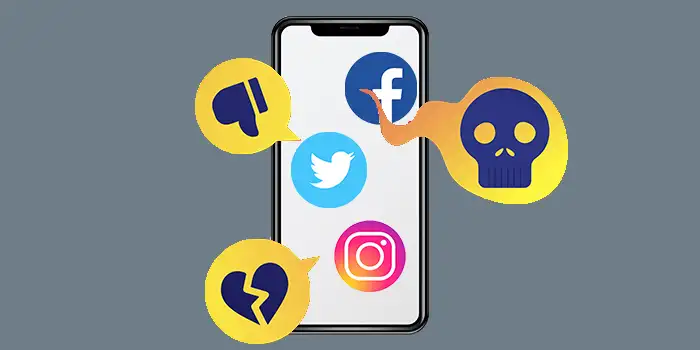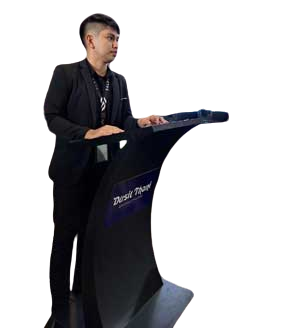I’ve experienced being addicted to social media for a very long time, especially during the period when social media platforms were just starting. To be quite honest, there were times when I frequently wondered if using these applications would harm my mental health and well-being.
Social media is toxic if there’s too much exposure and excessive consumption of negative content. It can contribute to feelings of social isolation and stress. Therefore, individuals need to use social media in moderation and be mindful of the type of content that they consume to avoid its toxic effects.
In this blog post, we’re going to discuss social media toxicity and how to recognize it. Let’s keep reading!
Is Social Media Toxic?
I feel that social media is a two-edged sword in that it can be both helpful and harmful depending on the information that people consume. Some individuals use social media to remain in touch with friends, stay educated, and even make a difference in the world.
But, social media may be damaging to people at times since it is a breeding ground for bad information.
So if you’re seeking a clear answer on whether social media is toxic or not, sorry to say but I can’t give you a simple yes or no answer.
What I mean by that is we need to know first how an individual uses social media and what type of information they usually consume.
A lot of research has already suggested that consuming harmful social media content such as cyberbullying or comparing yourself to others may contribute to feelings of social isolation and anxiety.
Based on my personal experience, I’ve seen both sides of social media. I’ve seen a lot of my friends post uplifting messages and share images of their cute dogs, which is positive content to consume.
On the other hand, I’ve also seen individuals who make harsh comments and propagate stories just to get some views or be popular.
From what I’ve noticed, the most toxic attitude that people do on social media is to create a culture of comparison. We frequently find ourselves reading through feeds full of photographs and stories of individuals who appear to be having the time of their lives.
We see photographs of individuals who appear to have flawless relationships, careers, bodies, and lives, and it’s easy to feel inadequate in comparison.
The issue with social media is that it frequently delivers a filtered version of reality. Individuals like to express only the positive aspects of their lives, which can make it easy to forget that everyone has ups and downs.
It’s easy to compare our life with others especially when we only see the highlights of their life.
Therefore, we can say that social media applications itself is not harmful but rather how it is used and the type of information that is being consumed.
People who are attentive to how they use social media can utilize it helpfully and minimize its potential negative effects.
It is now critical to be conscious of your behavior and how you interact with social media.
You can decrease its toxic impact on your mental health and well-being by setting suitable healthy boundaries. Limit your time on it and stick to positive and uplifting content.
How Is Social Media Toxic?
I believe that social media can be toxic in a few ways and here is the list of reasons why:
1. Comparing Oneself
Social media platforms present an edited representation of people’s lives such as highlighting their greatest moments, filtered photos, and carefully crafted captions. With this, it can lead to exaggerated life expectations causing people to compare themselves to others and feel inferior about their own lives.
I’ve seen several cases where social media has harmed people’s self-esteem and mental health. I remember one of my friends would continually compare himself to other people on Instagram and suddenly he will feel less attractive or accomplished.
It also resulted in a vicious loop for him where he continues to scroll on social media and feels horrible about himself. Then he will scroll even more to distract himself from negative feelings.
2. Cyberbullying
Cyberbullying is the use of internet communication to harass or bully someone. They usually do it anonymously or under a fictitious name.
I understand that social media may be a great method to remain in touch with friends and family by sharing images or life events. Nonetheless, some individuals may be harsh to one another online at times. That is why, for how many years, cyberbullying has been a huge concern.
As we all know, bullies can easily target others through social media sites because of the anonymity and distance given by social media. They can easily throw harsh and hateful words without fear of any consequences.
I’ve witnessed several cases of cyberbullying on social media such as abusive, threatening, or insulting remarks and messages. This must be stopped because it is extremely damaging to other people’s mental health. It can lead to anxiety, sadness, and even suicide.
One of my schoolmates during my high school days posted a photo on Instagram, then suddenly she was subjected to cyberbullying.
Several individuals commented on the photo, mocking her appearance and criticizing her attire. After that, she no longer wanted to use social media and was scared to share any images.
3. Spread of Misinformation
When social media platforms were developed, they became a breeding ground for false information and conspiracy theories. Because of the speed and scope of social media, bogus news and propaganda may spread fast, causing confusion and injury.
Misinformation can vary from medical advice to political propaganda, and it can have major ramifications for people and society as a whole.
I’ve seen a lot of misinformation on social media, including messages claiming that specific diets may heal cancer or that immunizations are unsafe.
The propagation of such disinformation can lead to individuals making risky decisions, disregarding scientific advice, or being confused about vital subjects.
One real-life example of misinformation on social media that I really hate was the anti-vaccination movement.
I respect the people who are afraid of vaccines because they were uneducated. I just hate those people who are making conspiracy theories that vaccinations will make us zombies.
For years, it made false claims regarding the safety and efficacy of vaccinations and it circulated all over social media platforms leading to a drop in vaccination rates and the recurrence of preventable illnesses like measles.
4. Social Media Addiction
Addiction to social media is another way that it is toxic. This is the most common reason why parents reprimand their children for constantly browsing through their phones from dawn to evening.
When talking about social media addiction, it means that it is characterized by an overpowering need to check social media continually even at inconvenient times such as work, class, or while you’re driving.
I have personally experienced the negative impacts of social media addiction on myself and I can really state that it’s extremely toxic. I find it difficult to concentrate on my work now, and I’m always tempted to check my phone to see the newest trends.
In addition, spending too much time on smartphones and computers can cause some eye strain and neck pain. This is a special reminder for those individuals who are dependent on social media and lack rest.
5. Filter Bubbles
Have you ever noticed how much of what you see on social media is already something you enjoy or agree with? This is known as a filter bubble, and it might be harmful.
I remember one of my friends posted something about politics which I disagreed with because I have a different opinion.
But as I scan through the comment sections, I noticed that everyone was stating the same thing my friend was saying. It was like everyone in my social media bubble seemed to think the same way.
Filter bubbles occur when social media algorithms provide us with material that they believe we would like or agree with. This can make it difficult to perceive other people’s points of view and generate a sense of division among individuals.
We begin to believe that everyone agrees with us and that everyone who disagrees is incorrect or evil.
But the truth is, there are many points of view out there and it’s critical for us to be open to hearing them. We may lose out on essential information or ideas if we only perceive things with which we already agree.
How to Prevent Social Media Toxicity
Social media is a fun place to stay especially if you want to connect with your friends and share life updates with them. But there are times that it feels toxic when you’re just scrolling around and reading what people post.
But worry not because there are things you can do to avoid social media toxicity:
- Take Breaks: Sometimes you need to disconnect from social media to refresh or recharge your mental batteries. When you start to get overwhelmed or anxious from scrolling too much, you need to do something else you love such as reading books or going for a walk.
- Unfollow Negative Accounts: You need to unfollow any account that makes you feel horrible about yourself or encourages negativity. It’s critical to fill our social media feeds with optimism and things that make us happy.
- Be Kind Online: You need to strive to be nice to others online and treat them in a way how you want to be treated. This includes refraining from cyberbullying or making harmful comments in favor of expressing optimism and love.
- Stay Safe: Internet users must make it a priority online to keep their personal information a secret. There are a lot of hackers today that try to steal information, that’s why you need to prevent yourself to be a victim of identity theft.
- Seek Help: If you feel overwhelmed on social media by seeing posts you didn’t like and have caused you anxiety, try to share with someone what you’ve seen on the internet. It can be your trusted friend or a family member. They can provide support in working through that unpleasant experience.
I believe that we can establish a positive and safe online community by applying the advice that I gave. Social media is an excellent tool for us, especially when connecting with others and sharing our experiences, but it’s also important that we use it in a way that promotes positivity.
Let’s work together to create social media a place where we can encourage one another, share our hobbies, and positively interact with others.
Ranking the Most Toxic Social Media Platforms
I frequently use social media and can attest that they are not all the same. But, I’ve found that certain networks are more toxic than others. The rankings I’ve provided here are based only on my own experience and may differ from others.
But I’m not saying that all these platforms only offer toxicity to their users, they also offer positive and helpful things.
1. Facebook
I used to be a regular Facebook user, but I’ve tried to avoid it due to the increasing amount of toxic individuals. There are a lot of harmful things out there such as cyberbullying, fake news, and scams that are not healthy.
There was also a lot of hate speech on Facebook. Individuals utilize the opportunity to express their negative opinions in an unprofessional manner even though they know they can hurt other people.
They accomplish this by focusing on individuals or groups based on their skin color, religion, or sexual orientation.
2. Twitter
In my experience, Twitter became a platform of political insanity. Individuals frequently use the platform to express their political views, and these debates may get hot and even toxic at times.
On Twitter, I’ve seen individuals attack one another because of their political opinions. They just don’t agree with each other, then sometimes it will lead to name-calling or personal assaults.
It’s easy to get caught up in the negativity when there’s so much political information on Twitter.
3. Instagram
Instagram is a popular social media networking site and compared to Facebook, I prefer to use this one.
But I believe that a toxic environment is still present here. This is a breeding ground for a variety of mental health issues because individuals frequently feel sad or upset when they observe other on Instagram having a good time.
On Instagram, I also noticed that self-esteem is a common problem for a lot of individuals out here. Watching others receive more likes, follows, or comments may make people feel unworthy.
4. Youtube
So, you know those YouTubers that produce videos where they’re extremely harsh, furious, or just not very nice? Toxic vloggers are what they’re called, and they’re sadly quite widespread these days.
I’ve watched a lot of harsh videos and I could say that they’re not entertaining. I came across a Youtuber who keeps on shouting at his viewers for not supporting him on his content. What I did was not view any of his videos anymore because it wasn’t that helpful for me.
5. Snapchat
Fake friendships are common on Snapchat and it might not be healthy for some people. One time I added someone on Snapchat who I thought to be an excellent friend.
When we started communicating and sharing images, I noticed that he wasn’t willing to share any of his information. I understood if he was concerned about his privacy, but there’s something off about him.
He’s quite creepy. That’s an example of fake friendship, it’s when someone claims to be your friend but isn’t truly interested in getting to know you.
Final Thoughts
This article taught you about the toxicity of social media and a lot more. But, I want you to keep in mind that the toxicity of social media depends on how you use it. For it to be helpful for you, you must use it carefully in order to prevent toxicity.
We may set time limits, follow content providers that produce uplifting material, and practice kindness online if we wish to utilize social media in a healthy way.
Also, if some social networking sites make us feel uneasy, try to recognize and decide to stay away from them. So let’s make good use of social media and ensure that it enhances our life!










